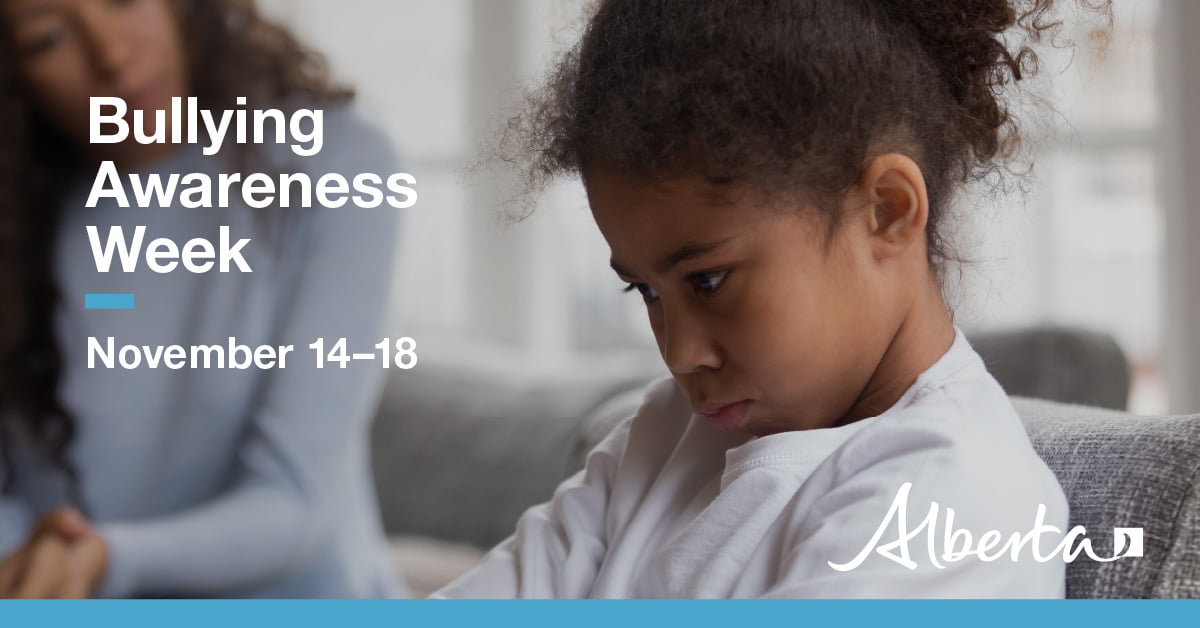
Bullying Awareness Week | #BekindAB
When a child reports that they hate school, there is a lot to unpack in that statement. Parents should pay attention.
When a child comes home with tears- saying that objects have been thrown at them at school. Parents should pay attention.
When a child becomes upset, does not like going to school, or becomes tearful, parents should pay attention. Bullying incidents are not limited to these examples.
Sometimes, we tell our kids to deal with it, to ‘chin up,’ not appreciating that children can be mean. Not one time, but all time. Some of our kids are called names, their feelings are hurt, and their self esteem is affected. A lot goes on at school that our children can not tell us.
We all know a child who has been bullied at school. Some adults are bullied at work as well – but that is not what we are talking about here. This write-up focuses on the provincial government.
This week -14th -18th November – is Anti-Bullying Week. Please keep reading to learn more about bullying. The theme is #bekindAB. We all need to be kind. It makes a difference.
What is Bullying?
“Bullying is a relationship problem that involves a power imbalance, which is why it can be so challenging to overcome it by ourselves. Regardless of where bullying happens – in school, the office, at home or in the community – some people and resources can help. This year’s theme, #BeKindAB, encourages everyone to recognize the importance of reaching out and being kind to everyone in our community. By using the hashtag #BeKindAB, you can help raise awareness this Bullying Awareness Week and together, we can all strive to model healthy relationships and strive to create more inclusive communities through kindness”.
Here are a few ways you can take part in Bullying Awareness Week:
- share bullying prevention resources on social media
- the Bullying Helpline (310-1818) is available 24/7 in over 170 languages
- start a discussion with your friends, family or coworkers about how to intervene
- write a letter or email to the editor of your local newspaper or radio station about the importance of promoting healthy relationships
Helplines
If you suspect someone is experiencing family violence or other types of abuse, contact:
- Family Violence Info Line: 310-1818 to get help anonymously 24/7 in more than 170 languages
- Child Abuse Hotline: 1-800-387-KIDS (5437) for help 24/7
- Sexual Violence One Line: Call or text 1-866-403-8000 from 9 am to 9 pm daily for confidential support.
- Abuse Helpline: 1-855-443-5722 for information on supports related to physical, sexual, emotional, mental abuse, exploitation or neglect. Help is available 24/7 in multiple languages.
- Protection for Persons in Care reporting line: 1-888-357-9339 to report the abuse of an adult receiving care or support services from public funded service providers such as:
- hospitals
- seniors’ lodges
- nursing homes
- mental health facilities
- shelters
- group homes
- addictions treatment centres
- other supportive living settings
Health helplines
- Mental Health Helpline: 1-877-303-2642 for mental health advice 24/7
- HealthLink: Call 811 to find health care and get health advice 24/



